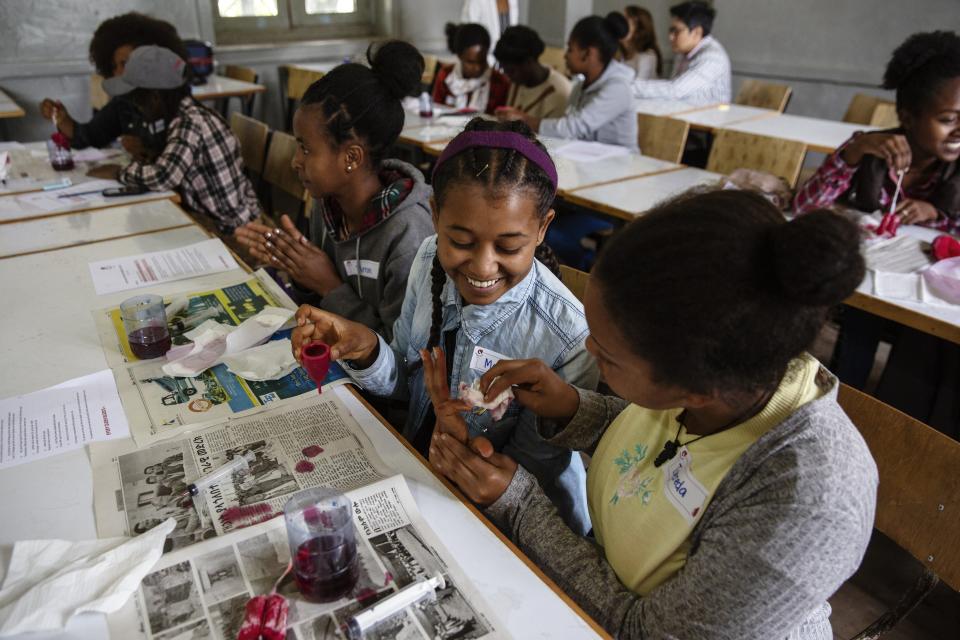Meet the Woman Bringing the Menstrual Cup Movement to Ethiopia
Menstrual cups, thought by many to be a relatively new phenomenon, actually date back to the 1930s. Invented by the American actress Leonora Chalmers as a discreet alternative to the cumbersome feminine hygiene contraptions that women once wore belted around their waists, menstrual cups are finally showing up on the shelves of major drugstores. This past July, the prestigious medical journal The Lancet issued an extensive global report endorsing their efficacy, the first of its kind.
Nevertheless, most people would be hard-pressed to identify the squishy, bell-shaped silicone receptacles, much less explain how they work. (To clarify, they’re designed to be inserted inside the vagina and can be worn for up to 12 hours at a time during menstruation; they’re also reusable for up to five years.) That fact is not lost on Sara Eklund, the woman behind Noble Cup, Ethiopia’s first menstrual cup brand. “On a recent trip to America, an immigration officer asked me what I do in Ethiopia, I told him I sell menstrual cups, but he had no idea what they were,” says Eklund. “When I explained it to him, he shook his head and said, ‘Oh, that would never work in America.’ So I told him, ‘Actually, it does.’”
While major strides have been made in the States to reduce the stigma surrounding menstruation, such conversations are still in their infancy in East Africa. As a teenager, Eklund remembers loading up her suitcase with tampons on family vacations to California which she would bring back to Ethiopia, where they are still considered taboo and not widely available. So when Eklund, who is now 30, discovered the menstrual cup as a 25-year-old grad school student living in New York, it was something of a revelation. At once cost-effective and environmentally friendly, the simple device had changed her life. Imagine what it could do for countless women in Ethiopia? “It was really the first time that I started to think outside of myself about how other women in Ethiopia were navigating this,” says Eklund, whose mother is an Ethiopian entrepreneur and father is an American member of the Peace Corps. “I knew I needed to do my research.”

The statistics she discovered were shocking: About a quarter of the women of reproductive age in Ethiopia have no access to menstrual products. Often fashioned from rags and/or newspaper, the homemade alternatives are ineffective and uncomfortable, also leaving women prone to vaginal infections. Given that most schools don’t have private bathrooms or running water, washing and disposing of menstrual products, improvised or otherwise, is often an insurmountable challenge, one that has contributed to widespread absenteeism. According to a recent report, the average high school girl in Ethiopia will miss around 20% of the academic year because they are on their cycle. With little to no information around women's health available in schools, 70% of girls in Ethiopia won’t even know about menstruation before their first period.
Working under the slogan “Every Queen Bleeds,” Eklund takes a grassroots approach to raising awareness. To coincide with the launch of Noble Cup last year, she began hosting interactive workshops on menstrual management in universities and schools across the country with the help of a small team of friends, extended family, and volunteers. “There is such a stigma around periods to the point that even purchasing basic menstrual products can be quite difficult for young women. Even those who have the resources to buy pads might avoid going to the shop if the storekeeper is male because of shame that could arise from that interaction,” she says. As Eklund sees it, her primary goal is clear: for Ethiopian women to make the switch to reusable cups, the conversation around menstrual health and hygiene needs to be normalized first and foremost.

With buzz quickly building on a local level, Eklund’s campaign is now beginning to attract high-profile international attention. Over the summer, Pakistani activist and Nobel Prize Laureate Malala Yousafzai was among those who joined a Noble Cup workshop at a high school in the capital Addis Ababa. Above and beyond providing products, these gatherings have been instrumental in helping create safe spaces where young women feel empowered to think differently about their own bodies. “I want girls to be able to reframe the conversation around menstruation in their communities and society as a whole,” says Eklund, who hopes one day to expand the social enterprise to create solutions for sexual and reproductive health issues in the future. “It starts by talking, sharing stories about periods. When we give out the cups, we encourage girls to give it a shot, but of course they’re scared. Maybe only a handful will try it at first, and that’s ok. The idea is that they will learn from each other, form new habits and dismantle the taboos together. I like to think of this as an activist movement that truly all women can be a part of, no matter where they are.”
Originally Appeared on Vogue

